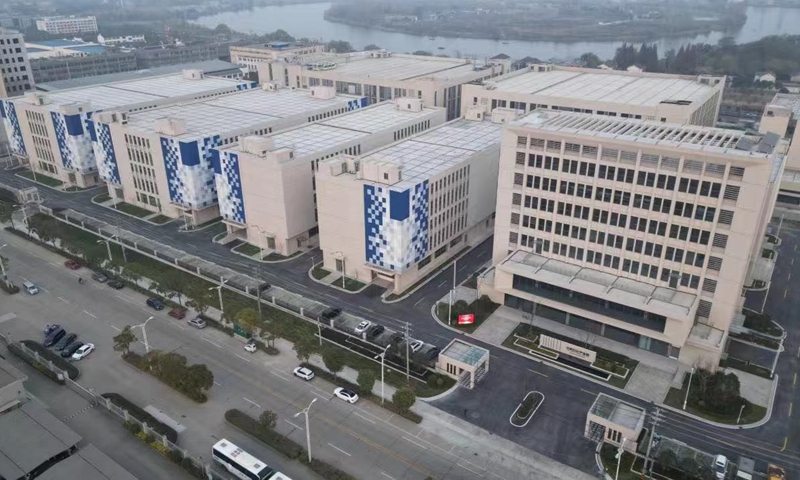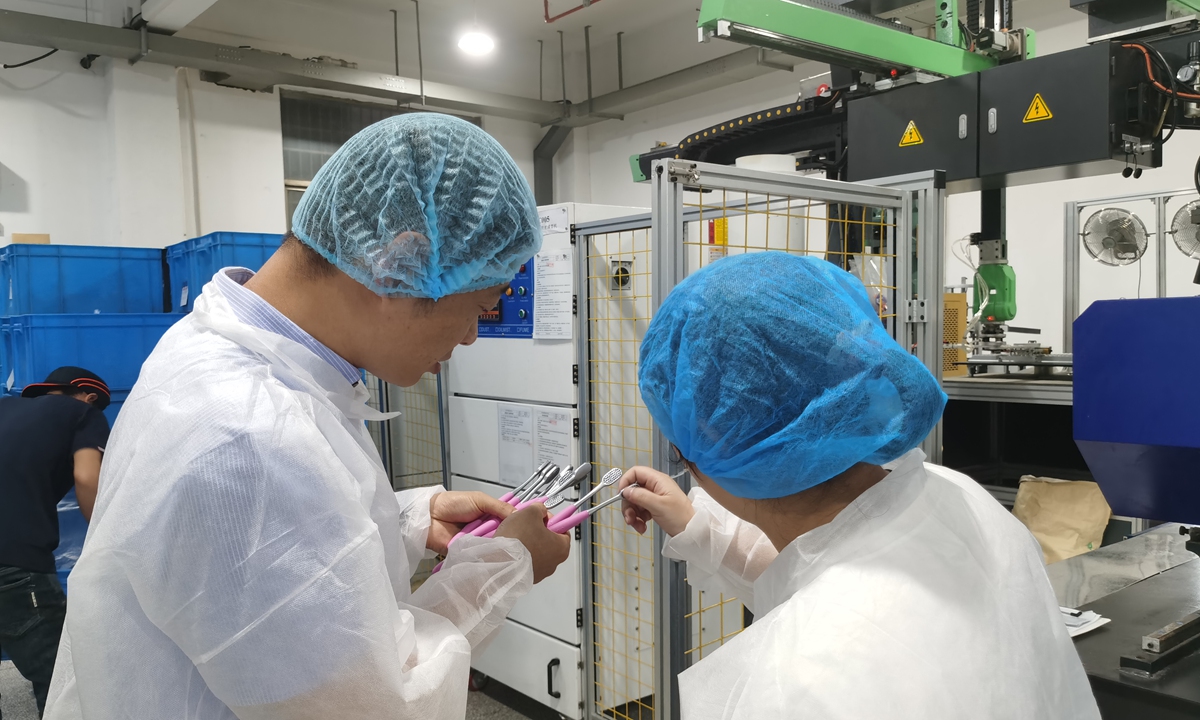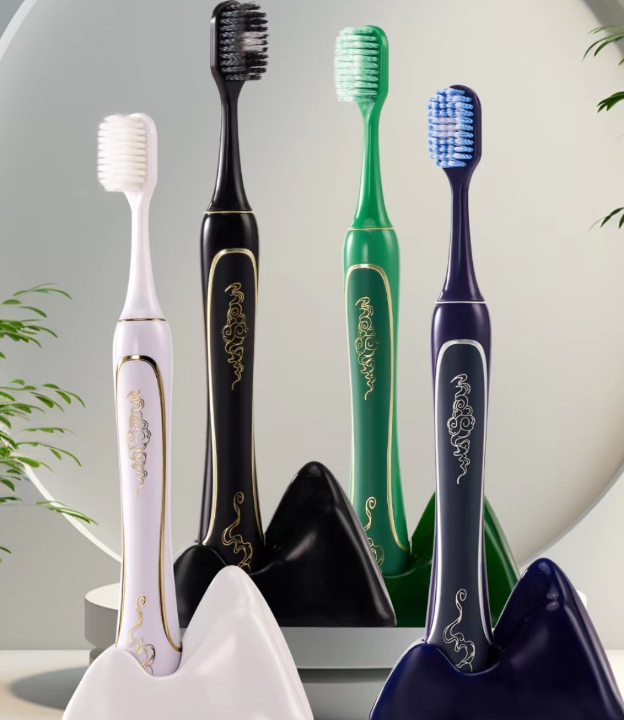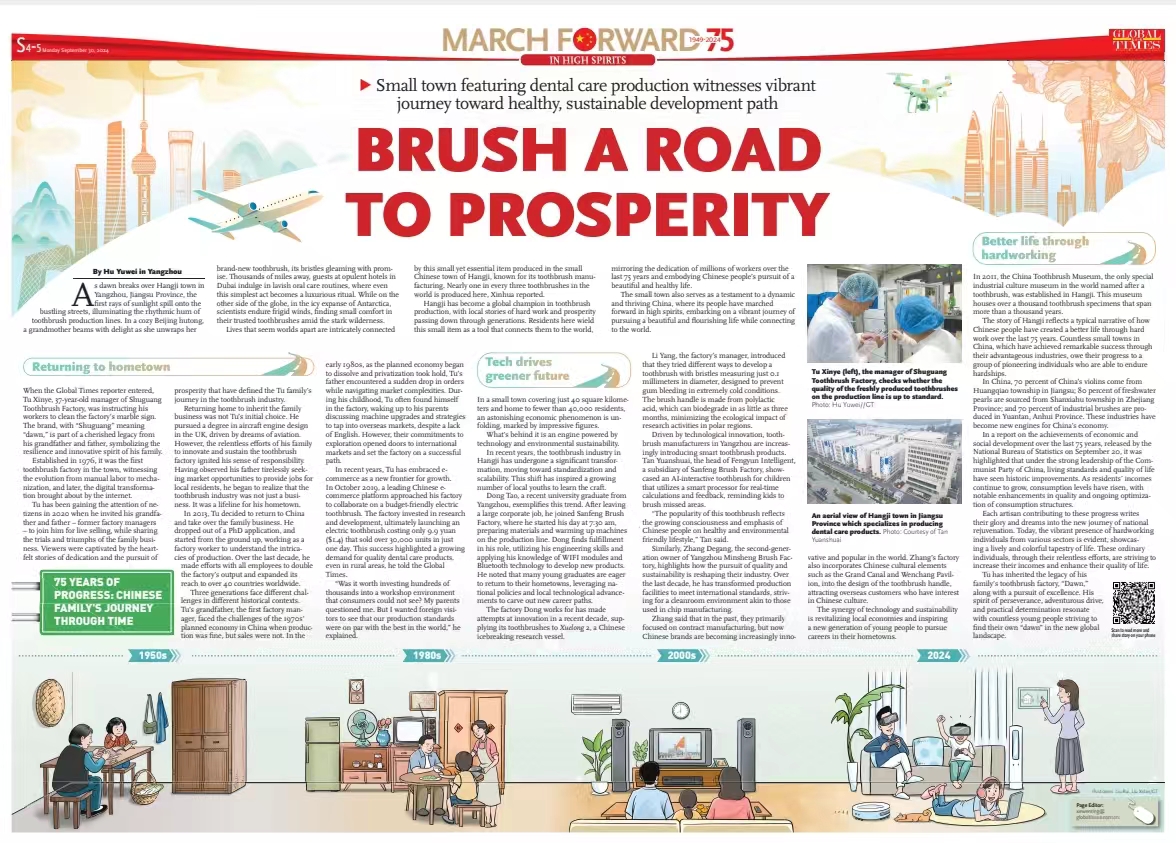
An aerial view of Hangji town in Jiangsu Province which specializes in producing dental care products. Photo: Courtesy of Tan Yuanshuai
Editor's Note:As this year marks the 75th anniversary of the founding of the People's Republic of China, the Global Times has launched the second volume of its "Wish List" series, which documents ordinary Chinese people's wishes as a window into the changes in and achievements of the Chinese path to modernization. In this volume, we present five representative stories that capture the aspirations and pursuits of individuals, which reflect the deep connection between national prosperity and people's destinies, illustrating how the Communist Party of China (CPC) and the country prioritize the well-being of the people in their quest for common prosperity, ecological civilization, and social harmony. They also bear witness to how Chinese people have marched forward toward Chinese modernization with high spirits. This is the first installment of a series that tells the story of how a small town in Yangzhou, East China, grows to become the country's dental care production center and witnesses a vibrant journey toward a healthy and sustainable development path for the Chinese people.As dawn breaks over Hangji town in Yangzhou, Jiangsu Province, the first rays of sunlight spill onto the bustling streets, illuminating the rhythmic hum of toothbrush production lines. In a cozy Beijing hutong, a grandmother beams with delight as she unwraps her brand-new toothbrush, its bristles gleaming with promise. Thousands of miles away, guests at opulent hotels in Dubai indulge in lavish oral care routines, where even this simplest act becomes a luxurious ritual. While on the other side of the globe, in the icy expanse of Antarctica, scientists endure frigid winds, finding small comfort in their trusted toothbrushes amid the stark wilderness.
Lives that seem worlds apart are intricately connected by this small yet essential item produced in the small Chinese town of Hangji, known for its toothbrush manufacturing. Nearly one in every three toothbrushes in the world is produced here, Xinhua reported.
Hangji has become a global champion in toothbrush production, with local stories of hard work and prosperity passing down through generations. Residents here wield this small item as a tool that connects them to the world, mirroring the dedication of millions of workers over the last 75 years and embodying Chinese people's pursuit of a beautiful and healthy life.
The small town also serves as a testament to a dynamic and thriving China, where its people have marched forward in high spirits, embarking on a vibrant journey of pursuing a beautiful and flourishing life while connecting to the world.

Tu Xinye (left), the manager of Shuguang Toothbrush Factory, checks whether the quality of the freshly produced toothbrushes on the production line is up to standard. Photo: Hu Yuwei/GT
Returning to hometownWhen the Global Times reporter entered, Tu Xinye, 37-year-old manager of Shuguang Toothbrush Factory, was instructing his workers to clean the factory's marble sign. The brand, with "Shuguang" meaning "dawn," is part of a cherished legacy from his grandfather and father, symbolizing the resilience and innovative spirit of his family.
Established in 1976, it was the first toothbrush factory in the town, witnessing the evolution from manual labor to mechanization, and later, the digital transformation brought about by the internet.
Tu has been gaining the attention of netizens in 2020 when he invited his grandfather and father - former factory managers - to join him for live selling, while sharing the trials and triumphs of the family business. Viewers were captivated by the heartfelt stories of dedication and the pursuit of prosperity that have defined the Tu family's journey in the toothbrush industry.
Returning home to inherit the family business was not Tu's initial choice. He pursued a degree in aircraft engine design in the UK, driven by dreams of aviation. However, the relentless efforts of his family to innovate and sustain the toothbrush factory ignited his sense of responsibility. Having observed his father tirelessly seeking market opportunities to provide jobs for local residents, he began to realize that the toothbrush industry was not just a business. It was a lifeline for his hometown.
In 2013, Tu decided to return to China and take over the family business. He dropped out of a PhD application, and started from the ground up, working as a factory worker to understand the intricacies of production. Over the last decade, he made efforts with all employees to double the factory's output and expanded its reach to over 40 countries worldwide.
Three generations face different challenges in different historical contexts. Tu's grandfather, the first factory manager, faced the challenges of the 1970s' planned economy in China when production was fine, but sales were not. In the early 1980s, as the planned economy began to dissolve and privatization took hold, Tu's father encountered a sudden drop in orders while navigating market complexities. During his childhood, Tu often found himself in the factory, waking up to his parents discussing machine upgrades and strategies to tap into overseas markets, despite a lack of English. However, their commitments to exploration opened doors to international markets and set the factory on a successful path.
In recent years, Tu has embraced e-commerce as a new frontier for growth. In October 2019, a leading Chinese e-commerce platform approached his factory to collaborate on a budget-friendly electric toothbrush. The factory invested in research and development, ultimately launching an electric toothbrush costing only 9.9 yuan ($1.4) that sold over 30,000 units in just one day. This success highlighted a growing demand for quality dental care products, even in rural areas, he told the Global Times.
"Was it worth investing hundreds of thousands into a workshop environment that consumers could not see? My parents questioned me. But I wanted foreign visitors to see that our production standards were on par with the best in the world," he explained.

Global Times
Tech drives greener future In a small town covering just 40 square kilometers and home to fewer than 40,000 residents, an astonishing economic phenomenon is unfolding, marked by impressive figures.
What's behind it is an engine powered by technology and environmental sustainability.
In recent years, the toothbrush industry in Hangji has undergone a significant transformation, moving toward standardization and scalability. This shift has inspired a growing number of local youths to learn the craft.
Dong Tao, a recent university graduate from Yangzhou, exemplifies this trend. After leaving a large corporate job, he joined Sanfeng Brush Factory, where he started his day at 7:30 am, preparing materials and warming up machines on the production line. Dong finds fulfillment in his role, utilizing his engineering skills and applying his knowledge of WIFI modules and Bluetooth technology to develop new products. He noted that many young graduates are eager to return to their hometowns, leveraging national policies and local technological advancements to carve out new career paths.
The factory Dong works for has made attempts at innovation in a recent decade, supplying its toothbrushes to Xuelong 2, a Chinese icebreaking research vessel.
Li Yang, the factory's manager, introduced that they tried different ways to develop a toothbrush with bristles measuring just 0.1 millimeters in diameter, designed to prevent gum bleeding in extremely cold conditions. The brush handle is made from polylactic acid, which can biodegrade in as little as three months, minimizing the ecological impact of research activities in polar regions.
Driven by technological innovation, toothbrush manufacturers in Yangzhou are increasingly introducing smart toothbrush products. Tan Yuanshuai, the head of Fengyun Intelligent, a subsidiary of Sanfeng Brush Factory, showcased an AI-interactive toothbrush for children that utilizes a smart processor for real-time calculations and feedback, reminding kids to brush missed areas.
"The popularity of this toothbrush reflects the growing consciousness and emphasis of Chinese people on healthy and environmental friendly lifestyle," Tan said.
Similarly, Zhang Degang, the second-generation owner of Yangzhou Minsheng Brush Factory, highlights how the pursuit of quality and sustainability is reshaping their industry. Over the last decade, he has transformed production facilities to meet international standards, striving for a cleanroom environment akin to those used in chip manufacturing.
Zhang said that in the past, they primarily focused on contract manufacturing, but now Chinese brands are becoming increasingly innovative and popular in the world. Zhang's factory also incorporates Chinese cultural elements such as the Grand Canal and Wenchang Pavilion, into the design of the toothbrush handle, attracting overseas customers who have interest in Chinese culture.
The synergy of technology and sustainability is revitalizing local economies and inspiring a new generation of young people to pursue careers in their hometowns.

Toothbrushes with design incorporating Chinese cultural elements produced by Zhang Degang's factory in Hangji Photo: Courtesy of Zhang
Better life through hardworkingIn 2011, the China Toothbrush Museum, the only special industrial culture museum in the world named after a toothbrush, was established in Hangji. This museum houses over a thousand toothbrush specimens that span more than a thousand years.
The story of Hangji reflects a typical narrative of how Chinese people have created a better life through hard work over the last 75 years. Countless small towns in China, which have achieved remarkable success through their advantageous industries, owe their progress to a group of pioneering individuals who are able to endure hardships.
In China, 70 percent of China's violins come from Huangqiao township in Jiangsu; 80 percent of freshwater pearls are sourced from Shanxiahu township in Zhejiang Province; and 70 percent of industrial brushes are produced in Yuantan, Anhui Province. These industries have become new engines for China's economy.
In a report on the achievements of economic and social development over the last 75 years, released by the National Bureau of Statistics on September 20, it was highlighted that under the strong leadership of the Communist Party of China, living standards and quality of life have seen historic improvements. As residents' incomes continue to grow, consumption levels have risen, with notable enhancements in quality and ongoing optimization of consumption structures.
Each artisan contributing to these progress writes their glory and dreams into the new journey of national rejuvenation. Today, the vibrant presence of hardworking individuals from various sectors is evident, showcasing a lively and colorful tapestry of life. These ordinary individuals, through their relentless efforts, are striving to increase their incomes and enhance their quality of life.
Tu has inherited the legacy of his family's toothbrush factory, "Dawn," along with a pursuit of excellence. His spirit of perseverance, adventurous drive, and practical determination resonate with countless young people striving to find their own "dawn" in the new global landscape.









